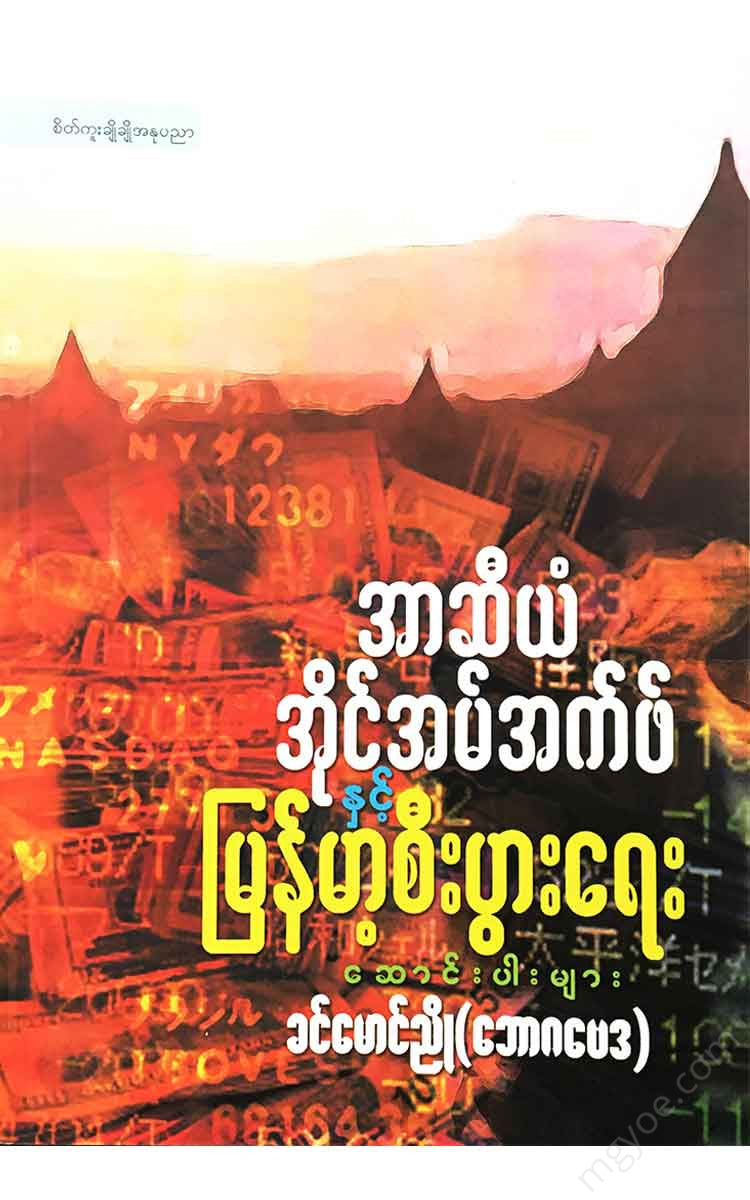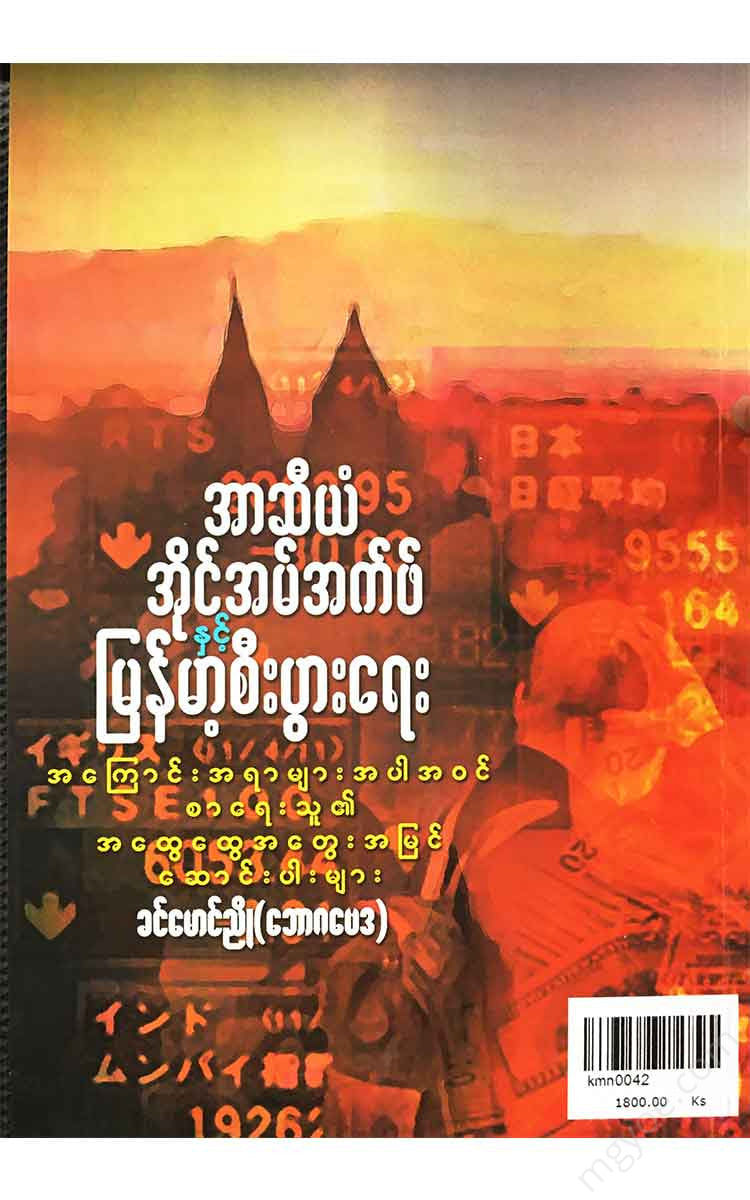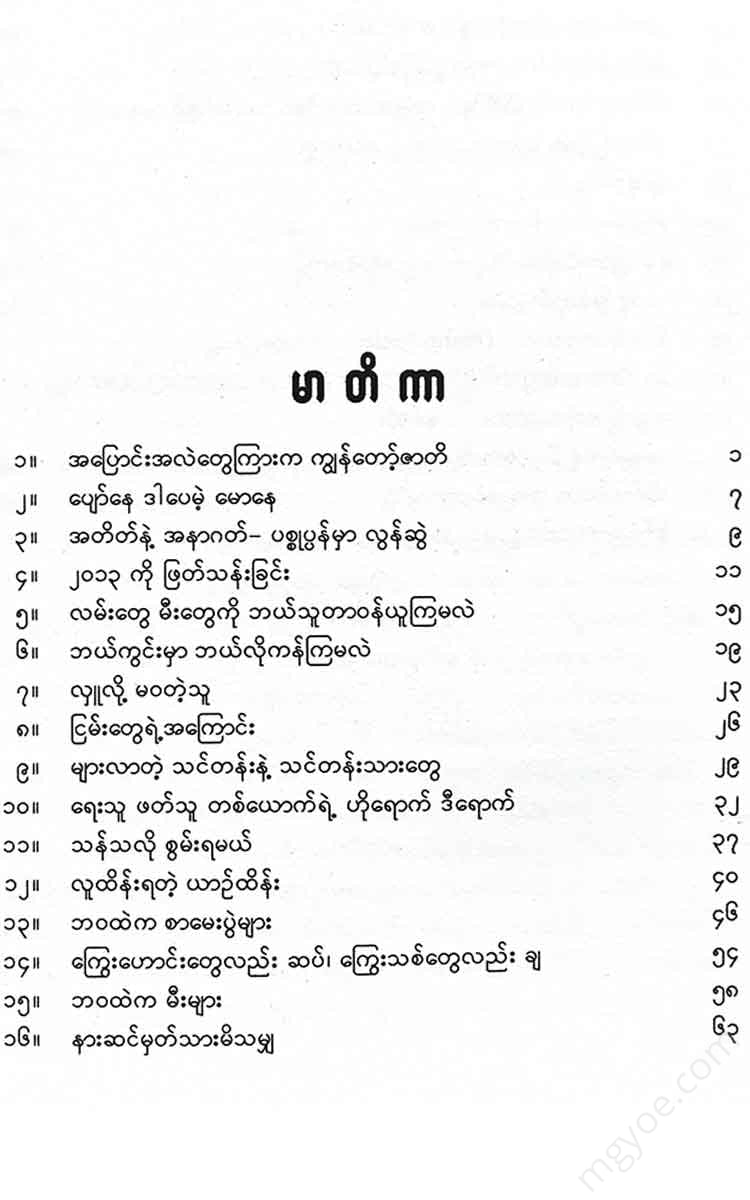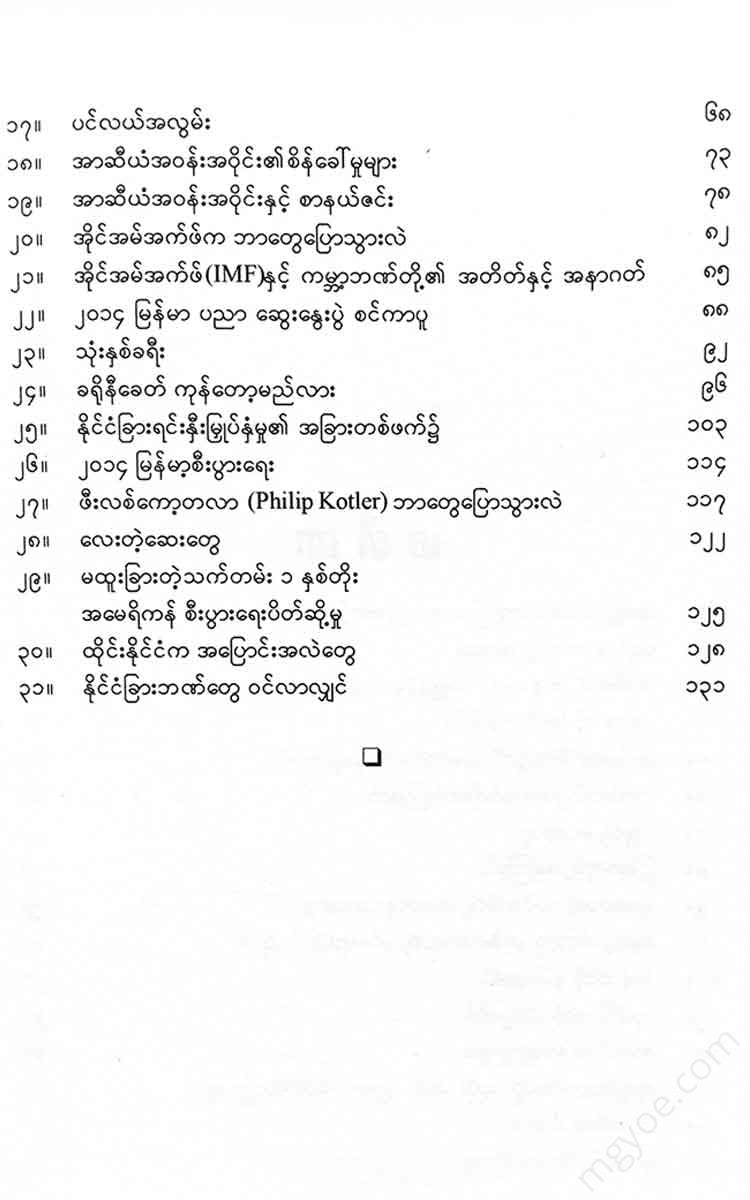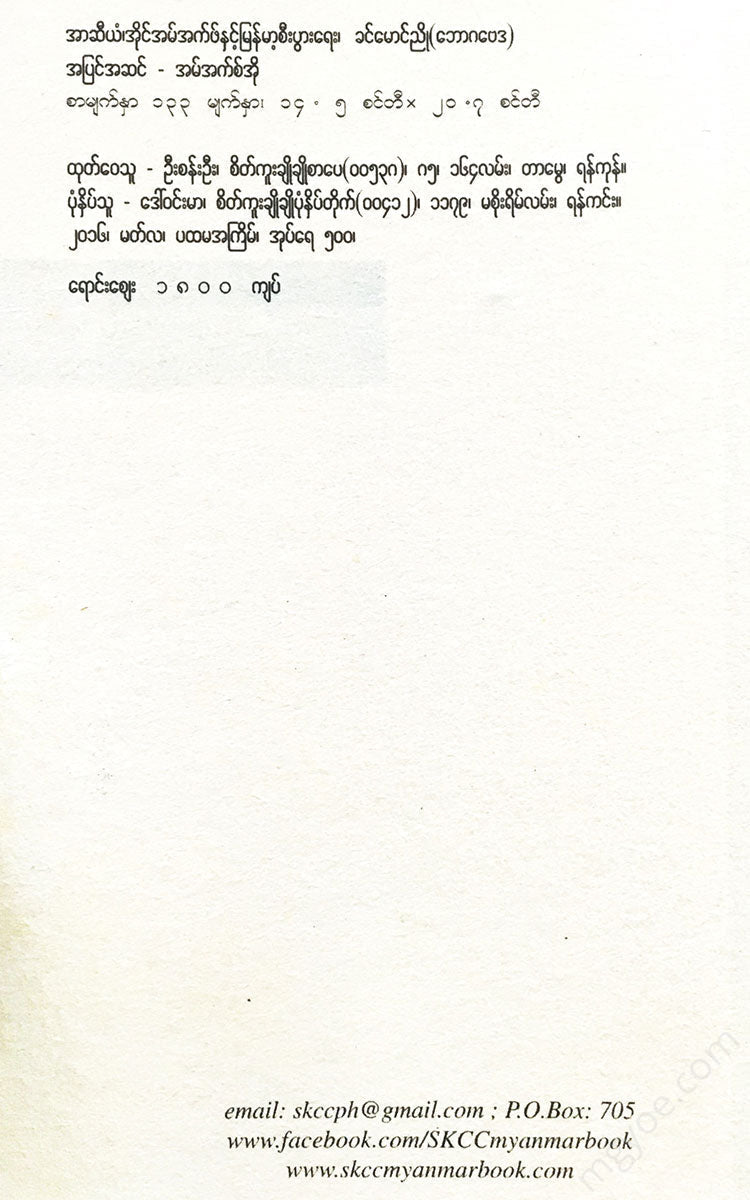စိတ်ကူးချိုချိုစာပေ
Khin Maung Nyo (Economics) - ASEAN IMF Myanmar Economy
Khin Maung Nyo (Economics) - ASEAN IMF Myanmar Economy
Couldn't load pickup availability
My homeland amidst the changes
This time, the journey back to my hometown was quite tiring, but it was a happy one.
The first thing that was fun was that we were able to go directly from Yangon to our hometown by express bus. The Shwe Sanka bus line from Aung Mingalar Expressway Terminal to Myingyan-Naw To Gyi has been extended to our location. I didn’t want to take the night bus because I was afraid of losing sleep, but I wanted to take the direct bus, and I wanted to support them, so I didn’t rent a car as usual on the trip to the Asarya offering ceremony. When I reached the 115th mile mark, I heard people calling me to go to Yangon. I just prayed that it would last a long time.
Leaving Yangon at 7 pm, we arrived at Meekthi, branching off the Myingyan road, passing through Nwathoygyi, Taungtha, and Myingyan. By nightfall, we were close to our hometown. After driving for about 12 hours, we passed through a small town called Myotha in our township, and soon arrived at Nangzun on a good asphalt road. We didn’t even reach the Tada U, Kyauk Talone, and Ywa Thit areas that we usually pass when coming from Mandalay.
So, we had a discussion at night. We had electricity, we had telephones. The road to Yangon was open. We could take a bus in the evening, arrive in Yangon in the morning, do some work in the afternoon, take a bus back at 7 pm, and return to Yangon the next morning. So we discussed how we could use these opportunities.
I went there at the invitation of my students and friends from Myo Thar, and they had electricity, but they didn't have long-distance telephones (mobile phones). Myo Thar is a busy town with good road connections than Ngan Zun, so I expect its development to be faster.
When I arrived at the festival, I rushed to eat with the people who had come to greet me. On the third day, I was encouraged to eat Ma Than Su's usual meal, and on the first two days, I was encouraged to eat at Ma Aye Mu's shop, and I saw that the shop had set up an extra table and was waiting for me. Ma Than Su, the customer, knew the reason and was ready to go. She gave me half of the rice and soup, but I couldn't pay.
The former students from the city fed them, kicked them, and talked endlessly, but at 2 o'clock, the Nang Zun A.H.K. had scheduled a lecture for the children, so they ran back. U Mya Gyi, who kindly accompanied them, was also a great influence not only in Nang Zun but also throughout Myanmar on the subject of industrialization, so we had the opportunity to hear his unique thoughts and opinions.
Before leaving for the trip, I went to a computer and phone shop and found a charging cable that I had never seen before in Yangon. It has two clips to charge batteries from cars and motorcycles, and can charge various phones at the same time. U Mya Gyi installed the cable in his car, so he could charge his phone on the go. “I brought extra batteries,” he said, encouraging people to carry batteries with them. If you look at U Mya Gyi’s Facebook, you will find Abhidhammas, Pathans, and Vipassana. If you want to meet him outside, don’t go looking for him at home. You can see Ngan Zun walking on the street about ten times a day.
In order to preserve the legacy of our parents and grandparents, we had the opportunity to visit the Thae Phyu School’s teaching center and help support the teaching activities at the right time. The Thae Phyu School’s monks allowed us to use the school’s car during the trip, but we did not use it because we were afraid it would interfere with their work. A relative, teacher Daw Ya Min, and two other teachers organized the ceremony to preach to the children waiting at the A.H.K. Most of the children were in the ninth grade. They were studying in the tenth and eighth grades.
Children will grow up to be happy if they are taught to work hard when they are young. If they are too busy when they are young, they will be tired when they are old. If you ask yourself, you are the master, if you are asked by others, you are the slave, if you do not ask yourself, others will ask you, you must do what is right and good, and if others do it, you must support them, etc. I have thought about what I think the children will understand. I have asked them to talk and ask questions. This time, I remember not giving the children bread when they did not bring books as gifts. After the lecture, I had to sign the children's books. It is true that the children's books will disappear for a while, but I think the practice of doing this to familiarize children with books and authors will remain.
In the evening, whenever I had time, I would meet with my aunts and relatives. No matter how imperfect my relatives were, they would always want to feed me, give me food, and give me food. This time, I also had to eat the stew cooked by an old aunt. They also asked about my daughter and sister's family who had not come with me.
The evening discussion was more open and free than last year, with more people attending. We were able to listen to the different views of the locals regarding regional development. We still need to practice the habit of accepting different ideas.
In general, I think that local friends are under the influence of different parties and can still coexist with each other. The discussion was very lively, so we were able to get through it quite a bit. However, the next day, when I heard a third party who I thought was biased, I asked him why he didn't dare to express his opinion in public. I especially urged people to think about how they would use the opportunities that emerged under the changes to develop their own region and their own businesses. I want them to rely on the roads in the south of the city, which replaced the Irrawaddy River, which has become a part of the islands in the north of the city.
When talking about the city, I can't help but think that I was still early in the morning when I went to alms-giving, and I had a cup of tea with a hundred beans and a cup of rice, but when I paid the money, it cost me two hundred (200) baht. The next day, my childhood friend U Chit Than told me that this money was not easy to find in Ngan Zun. As usual, we offered alms-giving at the Ngan Zun alms-giving association and distributed it to the deceased teachers and elders. This time, the family was given the opportunity to donate a day's worth of alms-giving to my grandmother Daw Hla Shwe and my parents U Chit Oo Daw Mya Yin, who had passed away after gaining faith. On the way back, I visited an elderly monk at Innwa Monastery in the east of the city and was surprised and happy to see that the monk remembered the names of my grandparents and parents.
In the morning, a former student, Daw Tint San, asked me to come and speak at the Htan Thanh Hla village etiquette class they run, so I rushed there on my motorbike and spoke for half an hour. The etiquette class, which was previously only in Ngan Zun, has now spread to the villages, and the children have been systematically practicing virtue, sending blessings, and giving alms. The children were delighted to see their names written on their names and praying for blessings, and I had to run back before the Asriya offering ceremony. Although I speak weekly on Cherry, Pattayar, and Sky Net , the audience who listen to Pattayar FM only saw me when I arrived at Htan Thanh Hla village.
When we returned to the Asariyya offering ceremony, there were already many people. I quickly changed into my traveling clothes and entered the Aung San Hall. I entered the hall to study. I left to serve.” The sign always reminded us. In the past, the Asariyya offering ceremony, which was held once every two years to thank those who served, was held once a year, so we were worried that it would be held once every two years. I was worried that if it were held every two years, there would be a significant decrease in the number of teachers and teachers. In fact, between last year and this year, the number of teachers who were kicked did not decrease, and the number of students who were kicked decreased by 9, according to one teacher.
While I was seeing things that were happy, I had to go to the funeral of a township party chairman who wanted me to run for parliament, and I had to apologize from the bottom of my heart for not being able to fulfill his wish. After the Asariyya ceremony, my friends took me on three motorbikes to see Nyan Myar, who said that there are many pagodas that are contemporary with Bagan. The road was pleasant, so I couldn’t stop taking pictures. The road was not as rough as the one I had driven the first time. I had the opportunity to see ancient pagodas, but I didn’t have any evidence, and I didn’t meet anyone who could tell me. I had a memorable experience eating local food on an island in the middle of the Ayeyarwady River, where there is a brick kiln. Their brick factory has an antenna on an island in the middle of the Ayeyarwady River, so they are constantly in touch with customers. The children who help their parents bake bricks don’t seem tired and seem happy. Nyan Myar takes 2 hours to get there and 2 hours to get back, In the evening, after taking in the countryside, I went to see the well in the A.H.T. school campus that I had donated to as a charity last year. When I got back home, I was so tired, my phone and camera batteries were dead, I couldn't even eat dinner, so I fell asleep.
On the day of my return, I went to the market and remembered what a teacher once said to me, “I want to have a market forever.” I noticed the faces of the vendors, smiling happily amidst the fresh seasonal produce. Friends from far away commented that the market was clean and tidy. I had been here for two or three days, so my relatives knew me, and strangers were familiar with me. The vendors and children from Htan Thanh Hla village greeted me and had a great time, but I had to say goodbye and say goodbye to them this evening.
During the afternoon lecture, some doctors and nurses from the hospital came to listen, and I introduced myself as a member of the hospital family. When I visited the hospital with my father, I saw that they were busy with visitors and were sitting in meetings. There used to be only one doctor, but now there are four or five doctors, a dentist, and nurses in full force, so the locals have come to rely on them and can get medicine for free. I was very happy and proud to receive all the help from the locals. In addition to the buildings being built at the hospital, I saw that there was a television and books to read. I also prayed that the doctors and nurses who came to my village could carry out their duties happily. I returned from Yangon, but on the way back, I had a good time discussing future education, health, and local development issues until I reached Yangon Gate.
7.1.2014
